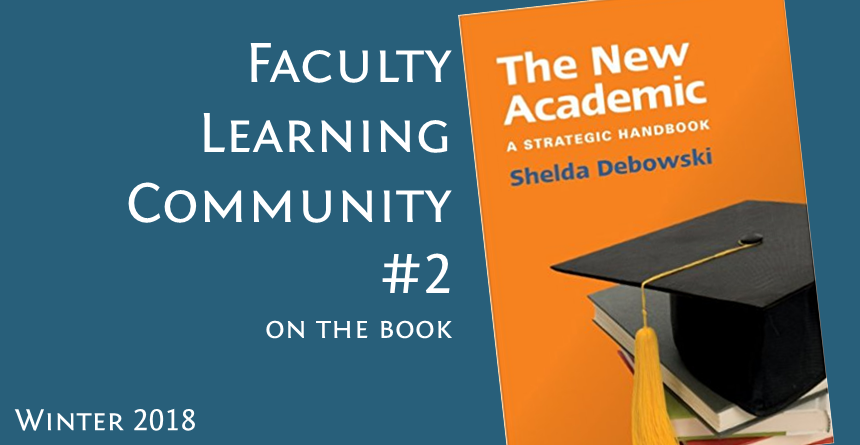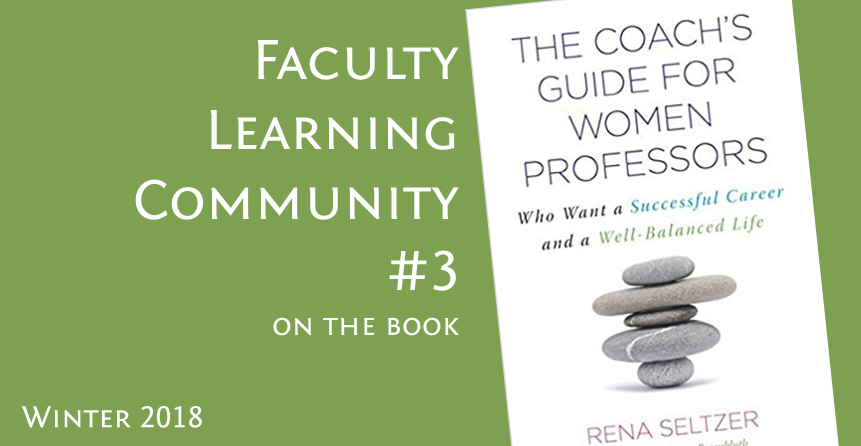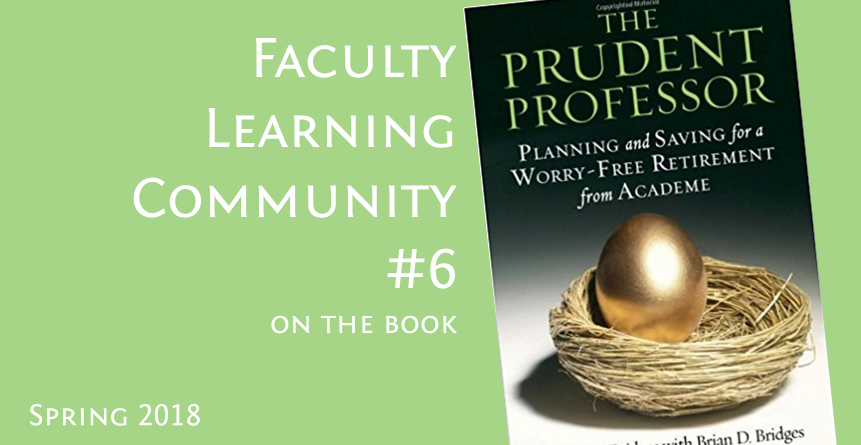
Faculty Learning Community Archive
Below you will find an archive of our past Faculty Learning Communities, listed in reverse chronological order. To see our current offerings, see the current Faculty Learning Community webpage.
2023–24
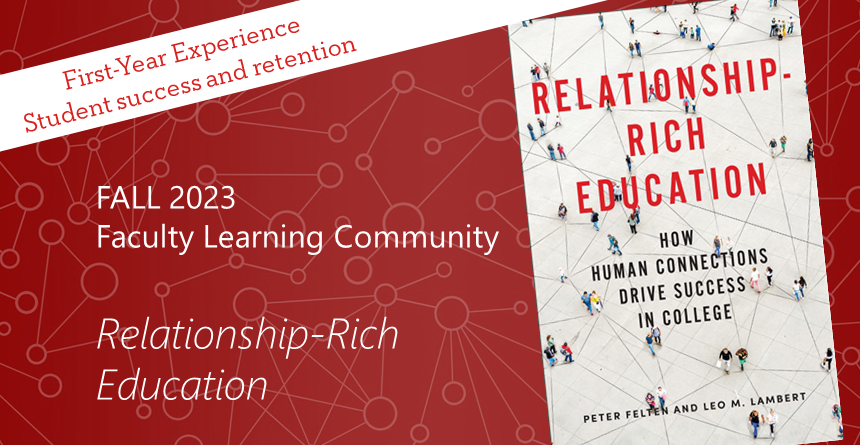
-
23FQ FLC Relationship-Rich Education - details
-
Faculty Learning Community
Relationship-rich education: How human connections drive success in college
Tuesdays: Oct 24, Nov 7, and Nov 28 | 11:00–12:15 | In person | Casey 515 | Coffee, tea, and snacks provided
Facilitated by Hilary Hawley (Director of First-Year Academic Engagement)
What can we do to boost our students’ sense of belonging and success in the classroom? What practical steps can make a difference? And how can we best support our growing number of students from first-gen and underrepresented backgrounds?
In Relationship-Rich Education, authors Peter Felten and Leo M. Lambert demonstrate that human relationships form the foundation of learning, belonging, and achieving in college, and they place special emphasis on the classroom: “the single most important site for students to experience welcome and care, to be inspired to learn, to build webs of relationships, and to ask questions of meaning and purpose” (p. 80).
The authors share stories from campuses large and small, in-person and virtual, to show how faculty have been able to make positive adjustments to their teaching to support both faculty-student and student-student relationships and mentoring.
Significantly, they note that while designing for welcome and inclusion is good for all students, relationship-rich education is especially beneficial for students on the margins of higher education, including first-generation students, BIPOC students, and LGBTQIA students.
In this three-session learning community for faculty, facilitated by Hilary Hawley (Director of First-Year Academic Engagement), you’ll read through the book with colleagues and explore questions both transformative and practical to your work as an educator.
Who is it suited to?
This community is open to all faculty looking to make concrete shifts in pedagogy and practice. Faculty
who regularly engage with first-year students are particularly encouraged to apply.15 places are available on a first-come, first-served basis.
Relationship-Rich Education is 160 pages long, and the reading will be split across the three sessions to be manageable for participants.
What are the dates?
This learning community meets in Casey 515 on:
- Tue, Oct 24 | 11:00-12:15
- Tue, Nov 7 | 11:00-12:15
- Tue, Nov 28 | 11:00-12:15
Tea, coffee, and snacks will be provided at all sessions.
- Register by 9:00 am on Wed, Oct 11
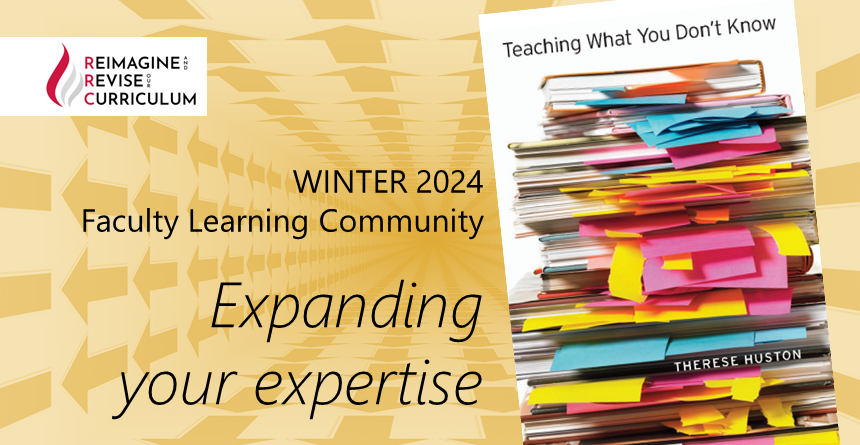
-
24WQ FLC Expanding your expertise - details
-
Faculty Learning Community
Expanding Your Expertise
Mondays: Jan 29, Feb 12, and Feb 26 | 12:301:45 | Via Zoom | Zoom link provided upon registration
Facilitated by Brenda Bourns (Biology)
As we Reimagine and Revise our Curriculum, many of us are realizing that we’re going to be teaching exciting new courses and topics. Sometimes, those topics dip into wells of prior knowledge that may need a little dusting off and brushing up from our days as grad students. But for many of us, these are going to be brand new areas – ones that ask us to expand and enrich our existing expertise to develop new areas of strength in our knowledge and teaching. So how do we get there?
In this learning community, facilitated by Dr Brenda Bourns (Biology), we’ll be guided by the work of Therese Huston, founding director of Seattle University's Center for Faculty Development, and her book Teaching What You Don’t Know. Through dozens of interviews with faculty across North America, Huston firstly establishes that teaching outside our expertise is the norm in higher education, not the exception. She then offers us creative strategies for dealing with typical issues related to teaching new subjects. How can you prepare most efficiently for a new course or a new area? How do you look credible? And what do you do when you don’t know how to answer a student’s question?
Encouraging us as faculty to think of ourselves as learners rather than experts, Huston points out that authority doesn’t come only, or even mostly, from perfect knowledge. She offers recommendations and examples for introducing new topics in a lively style, for gauging students’ understanding, for reaching unresponsive students, for planning your class so that you’re not overworked all the time, and – yes – for dealing with those impossible questions.
Over the course of three sessions, you’ll read through the book with colleagues and explore questions both transformative and practical to your work as both a learner and an educator in the process of expanding your expertise in your teaching.
Who is it suited to?
This community is open to all faculty who will be teaching new topics or new courses as part of the reimagined curriculum. No matter what level of students you teach – undergrad, grad, law – and whether in-person or remote, this series is suitable for you.
15 places are available, on a first-come, first-served basis.
Teaching What You Don’t Know is 263 enjoyable pages long, and the reading will be split across the three sessions to be manageable for participants. And if you choose to read the footnotes, you’ll find that the text even sparkles there, too.
» Register by 9:00 am on Fri, Jan 19th
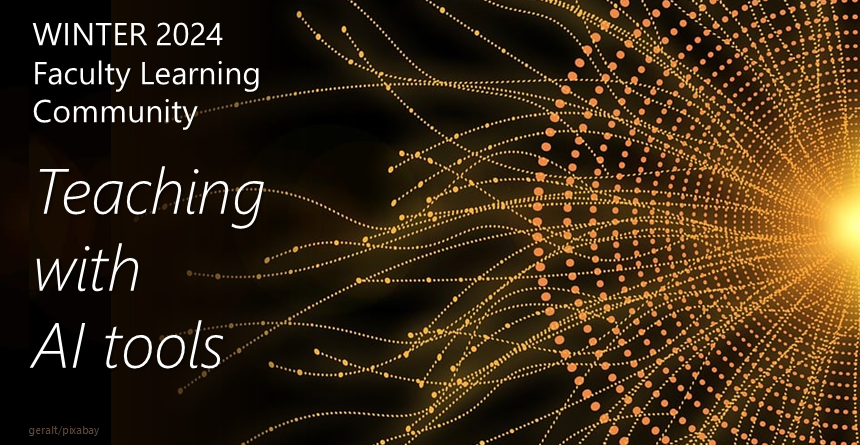
-
24WQ FLC Teaching with AI tools - details
-
Faculty Learning Community
Teaching with AI tools
Tuesdays: Jan 30, Feb 13, and Feb 27 | 2:00–3:15 | Via Zoom | Zoom link to follow
Co-sponsored by the College of Science & Engineering
Facilitated by Onur Bakiner (Political Science)
For the past year, higher education around the world has been grappling with the implications of generative artificial intelligence (AI) on teaching and on students’ learning. In that time, new AI-powered educational tools have emerged and been promoted, leaving educators simultaneously excited and nervous. And as AI capabilities expand, we are presented with new opportunities – and at times new quandaries – to consider.
Knowing that our students already have access to generative AI, how do we work with AI tools for instruction and assignment design, and how do we help our students learn to do the same?
In this three-session learning community, participants and facilitator will be co-learners exploring the potential of working with AI tools in teaching and learning, as well as sharing their experiences to date – and potentially trying out some new ideas and reporting back.
In preparation for each of the three sessions, you’ll read or listen to some online materials so that the conversation can start from a shared understanding.
Who is is suited to?
This community is open to all faculty interested in exploring how they and their students can work WITH AI tools as part of the learning process at any educational level.
20 places are available, on a first-come, first-served basis.
» Register by 9:00 am on Thu, Jan 25th
2022–23
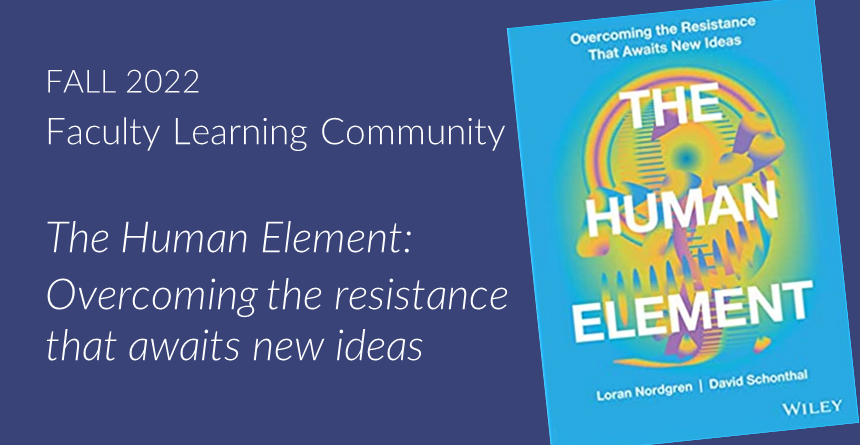
-
22FQ FLC The Human Element - details
-
Faculty Learning Community
The Human Element: Overcoming the resistance that awaits new ideas
Tuesdays: Oct 11, Oct 25, and Nov 8 | 1:30–2:45 | In person | HUNT 160 | Coffee and tea will be provided
Facilitated by David Green
Do you have a new idea or innovation you’d like to introduce at SU? Are you wondering how to bring your colleagues on board?
Common practice says that the best way to convince people to take up a new idea is to heighten the appeal of the idea itself. But what about the discomfort and hesitations that hold us back from changing?
In their book The Human Element: Overcoming the Resistance That Awaits New Ideas, authors Loren Nordgren and David Schonthal call the former approach “fuel-based” and label the latter “frictions.” They explore four important frictions (inertia, effort, emotion, and reactance) and introduce readers to corresponding strategies that will help their ideas shine.
In this three-session Learning Community, facilitated by David Green (Center for Faculty Development), we'll work our way through the chapters of the book, discussing where it resonates or aggravates, where it’s immediately applicable or requires some adjustment, and we’ll consider how it might aid our own attempts to bring colleagues on board with new ideas.
What can you expect?
Over the three sessions, you'll learn:
- Why ideas get rejected – despite their undeniable value.
- How frictions operate in a range of settings.
- How to transform those frictions into catalysts for change.
Who is it suited to?
If you’re involved in any change initiatives on campus – whether around curricular change, systemic change, or shared governance change – then the ideas in this book could help you feel more effective and enthusiastic in your work, as well as enabling your ideas to be championed more widely. This book is also well-suited to all faculty who are full of great ideas.
The Human Element is 210 pages long, and reading will be split across the three sessions to be manageable for participants.
What are the dates?
This learning community meets in Hunthausen 160 on:
- Tue, Oct 11 | 1:30–2:45
- Tue, Oct 25 | 1:30–2:45
- Tue, Nov 8 | 1:30–2:45
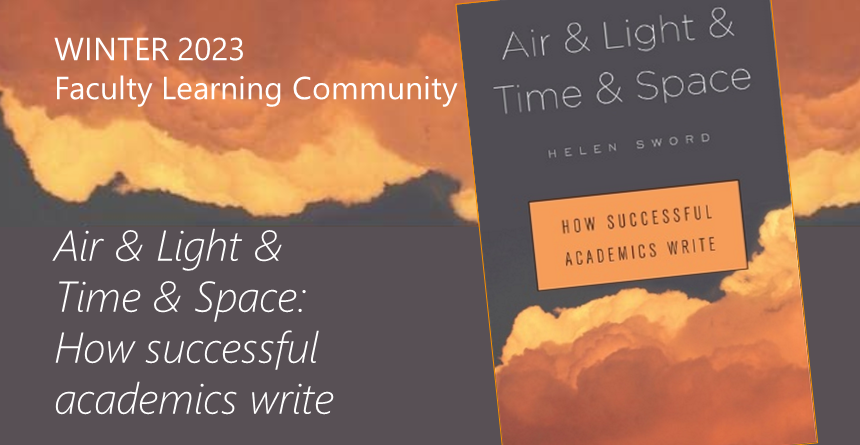
-
23WQ FLC Air & Light & Time & Space - details
-
Faculty Learning Community
Air & Light & Time & Space: How successful academics write
Mondays: Jan 30, Feb 13, and Feb 27 | 11:00–12:15 | In person | Casey 220 | Tea, coffee, and snacks provided
Facilitated by David Green
How do successful academics find the “air and light and time and space” (in the words of poet Charles Bukowski) to get their research done? How do they go about their writing process? And how do they summon up the courage to take intellectual risks and the resilience to deal with rejection?
From interviews with one hundred faculty members around the world, Helen Sword identifies four cornerstones that anchor any successful research and writing practice:
- Behavioral habits of discipline and persistence;
- Artisanal habits of craftsmanship and care;
- Social habits of collegiality and collaboration; and
- Emotional habits of positivity and pleasure.
Building on this “BASE,” Sword illuminates the emotional complexity of the research and writing process and exposes the lack of research and writing support typically available to early career academics. She also lays to rest the myth that academics must produce safe, conventional prose or risk professional failure.
In this three-session Learning Community, facilitated by David Green (Center for Faculty Development), we’ll work our way through the chapters of the book, identifying our own writing BASEs, as well as exploring which strategies from the book draw us in and which send us running to the hills.
The successful writers profiled in the book tell stories of intellectual passions indulged, disciplinary conventions subverted, and risk-taking rewarded. Grounded in empirical research and focused on sustainable change, Sword’s book offers a customizable blueprint for refreshing your personal research and writing habits and creating a collegial environment where all writers can flourish.
What can you expect?
Over the three sessions, you'll:
- Identify your own research and writing habits to date to find out your “BASE.”
- Discover different approaches that could enrich your research practice.
- Have an opportunity to practice new ideas and report back on them.
Who is it suited to?
This book may be especially suited to early career faculty, as well as to faculty who are seeking to reboot their approaches to their research and writing.
Air & Light & Time & Space is 206 pages long, and reading will be split across the three sessions to be manageable for participants.
What are the dates?
This learning community meets in Casey 220 on:
- Mon, Jan 30 | 11:00–12:15
- Mon, Feb 13 | 11:00–12:15
- Mon, Feb 27 | 11:00–12:15
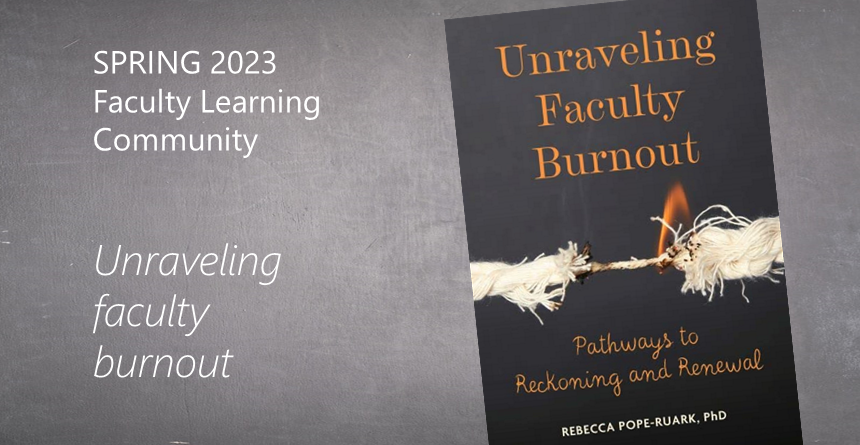
-
23SQ Unraveling faculty burnout - details
-
Faculty Learning Community
Unraveling faculty burnout: Pathways to reckoning and renewal
Mondays: Apr 24, May 8, and May 22 | 11:00–12:15 | In person | Hunthausen 110 | Tea, coffee, and snacks provided
Co-facilitated by Katherine Raichle and Andrea Verdan
In an academic culture that values productivity, competition, and external recognition, it is unsurprising when faculty—particularly women and faculty of color—find themselves stressed, overwhelmed, and weary. Left unchecked, these feelings can lead to burnout, characterized by energy depletion, work-related apathy or cynicism, and feelings of inadequacy.
In this learning community, we will read Unraveling Faculty Burnout, a book by Rebecca Pope-Ruark, who explores how we can reframe our experiences and conversations to mitigate burnout, specifically addressing the stressors unique to female and female faculty of color. From the book:
Pope-Ruark “helps faculty not only address burnout personally but also use the tools in this book to eradicate the systemic conditions that cause it in the first place. As burnout becomes more visible, we can destigmatize it by acknowledging that women are not unraveling; instead, women in higher education are reckoning with the productivity cult embedded in our institutions, recognizing how it shapes their understanding and approach to faculty work, and learning how they can remedy it for themselves, their peers, and women faculty in the future.”
In this three-session Learning Community, facilitated by Katherine Raichle (Psychology / Center for Faculty Development), and Andrea Verdan (Chemistry / Center for Faculty Development), we will discuss strategies and practices to counter burnout. In this space we invite faculty to engage in open and honest conversations about academic culture that often asks us to hide our failures, lulls, and periods of low productivity.
What can you expect?
Over the three sessions, you'll learn about the “four pillars of burnout resilience,” as discussed in the book:
- Re-discovering your purpose and sense of meaningful work
- Practicing compassion for yourself and others
- Deepening connections with peers and mentors
- Re-establishing realistic balance through self-care and setting boundaries
Who is it suited to?
While the book focuses on female faculty and female faculty of color, this learning community is open to all faculty.
Unraveling Faculty Burnout is 256 pages long, and reading will be split across the three sessions to be manageable for participants.
What are the dates?
This learning community meets in Casey 220 on:
- Mon, Apr 24 | 11:00–12:15
- Mon, May 8 | 11:00–12:15
- Mon, May 22 | 11:00–12:15
Tea, coffee, and snacks will be provided at all sessions.
» Register
2021–22
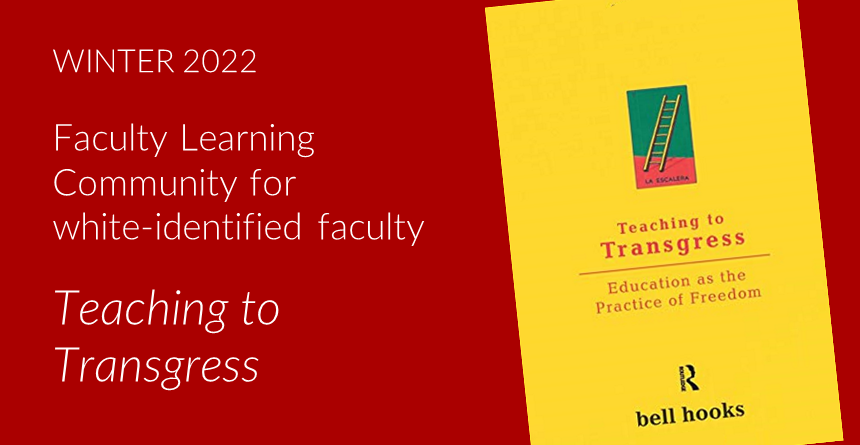
-
22WQ FLC Teaching to Transgress - details
-
Faculty Learning Community
Teaching to Transgress
Mondays: Jan 24, Feb 7, and Feb 28 | 12:30–1:45 | Zoom link provided upon registration
Facilitated by Roxy Hornbeck (Performing Arts & Arts Leadership)
Co-sponsored by the Office of Diversity and Inclusion
Almost 20 years since its publication, Teaching to Transgress remains essential reading for educators seeking to reground their own practice in social and racial justice. In her book, hooks calls on educators to "transgress" against current educational practices that sustain racial, gender, and class inequities. Rather, she challenges us to reimagine a more liberatory practice of teaching, inviting us into a conversation about how to institute deep systemic change in our pedagogy, and reshaping our practices beyond the superficial. In her own words, "To educate as the practice of freedom is a way of teaching that anyone can learn." In this learning community, we will focus on the unique work that white faculty members need to do in their roles as leaders and teachers to promote more just and equitable spaces.
The author of Teaching to Transgress, Black feminist intellectual, professor, and activist, bell hooks, passed away on December 15, 2021 at the age of 69. This learning community honors her legacy and reminds us that the voices of Black Women who came before can be carried on in the work we do today.
In this three-session learning community for white-identified faculty, facilitated by Roxy Hornbeck (assistant professor of Arts Leadership), you'll read through the book with colleagues and explore how hooks's ideas and challenges can reshape your own work as an educator.
Who is it suited to?
This community is for any white-identified faculty member who wants to move beyond self-awareness around racial identity to make concrete shifts in pedagogy and practice.
Fifteen spaces are available on a first-come, first-served basis.
Teaching to Transgress is 200 pages long and the reading will be split across the three sessions to be manageable for participants. It is available to SU faculty electronically via Lemieux Library. Alternatively, the Center is pleased to be able to offer hard copies of the book, to be delivered to a location of your choice.
What are the dates?
The three dates in Winter Quarter are:
- Mon, Jan 24 | 12:30–1:45
- Mon, Feb 7 | 12:30–1:45
- Mon, Feb 28 | 12:30–1:45
» Register
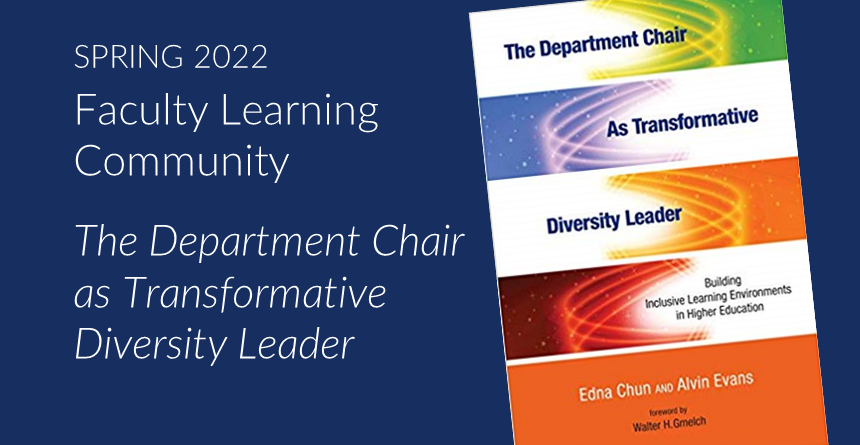
-
22SQ Department Chair as Transformative Diversity Leader - details
-
Faculty Learning Community
The Department Chair as Transformative Diversity Leader
Fridays: Apr 22, May 6, and May 27 | 11:00–12:15 | Zoom link provided upon registration
Co-sponsored by the Office of Diversity and Inclusion (ODI)
Facilitated by Katherine Raichle
Are you interested in seeking concrete tools and strategies for successfully implementing diversity in your department or program? Edna Chun and Alvin Evans’s The Department Chair as Transformative Diversity Leader: Building Inclusive Learning Environments in Higher Education provides practical, research-based approaches representative of best practices from across the United States to achieve this result.
In this three-session Learning Community, facilitated by Katherine Raichle (Center for Faculty Development), you'll work your way through the chapters of the book so that you are better prepared to lead other faculty in advancing diversity in multiple areas, including tenure and promotion, curricular change, student learning outcomes, departmental climate, and the representation of a diverse faculty and staff.
What's in it for you?
Over the three sessions, you'll learn how to:
- Implement a conceptual framework for diversity transformation
- Develop strategies for attaining consensus on a diversity agenda
- Develop strategies for overcoming environmental hurdles and navigating the academic infrastructure
- Recruit and retain a diverse faculty
- Enhance diversity learning outcomes and student identity development
- Develop a department or program diversity strategic plan
Who is it suited to?
This community is primarily for incoming or established department chairs and program directors, but other faculty members who are interested in promoting an inclusive learning environment would also benefit from this learning community.
The Department Chair as Transformative Diversity Leader is 181 pages long, and reading will be split across the three sessions to be manageable for participants.
What are the dates?
The three dates in Spring Quarter are:
- Fri, Apr 22 | 11:00–12:15
- Fri, May 6 | 11:00–12:15
- Fri, May 27 | 11:00–12:15
- Zoom link provided upon registration
» Registration is now closed.
2020–21
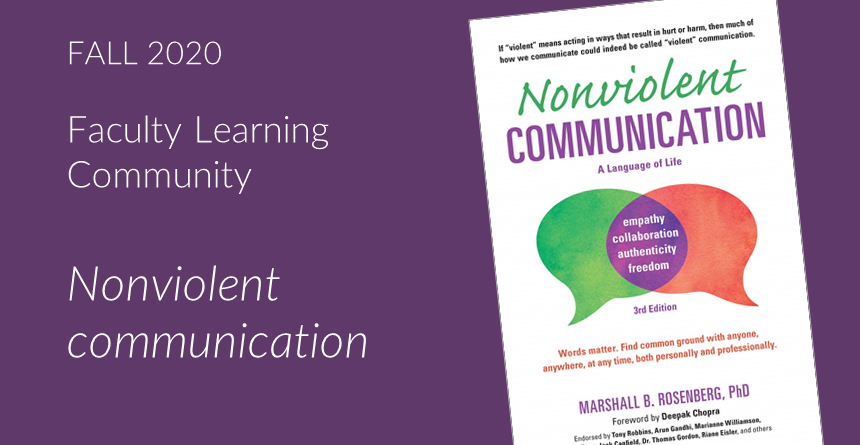
-
20FQ FLC Nonviolent communication - details
-
Faculty Learning Community
Nonviolent communication: A language of life
Co-sponsored by the Office of the Faculty Ombudsperson
How can we better connect with one another and understand our varied perspectives in an age of physical distance and remote working? In our computer-mediated reality, many of our in-person strategies for fostering community and understanding no longer function effectively, so new approaches are required. Here, Marshall Rosenberg’s model of nonviolent communication (NVC, also called “compassionate communication”) offers us ways of proceeding.
NVC is a four-stage process for engaging with one another to build trust through listening empathically and expressing ourselves honestly. Rooted in social justice, NVC prioritizes respect for differing worldviews. While the model appears straightforward, it requires practice and care – as well as asking us to unlearn our cultural norms in communication. The rewards can be significant, and when effectively used, this carefully developed communication method can lead to smoother and more productive teamwork.
In this three-session Learning Community, facilitated by McKenna Lang (Faculty Ombudsperson) and David Green (Center for Faculty Development), you’ll read through the book with colleagues and explore how we can practice and apply NVC in our current circumstances and beyond.
What's in it for you?
Over the three sessions, you'll learn how to:
- Distinguish the four NVC steps of observations, feelings, needs, and requests
- Identify how everyday language can inadvertently mask candid expression
- Express yourself more clearly using the model
- Apply the model as you listen to others
Who is is suited to?
This community is for any faculty member who wishes to develop their skills in communicating for understanding and finding ways to bring people together through compassionate yet candid dialogue.
Nonviolent communication is 219 pages long, and the reading will be split across the three sessions to be manageable for participants.
What are the dates?
The three dates in Fall Quarter are
- Mon, Oct 5 | 11:30–12:15 | Zoom link provided upon registration
- Mon, Oct 19 | 11:30–12:15 | Zoom link provided upon registration
- Mon, Nov 2 | 11:30–12:15 | Zoom link provided upon registration
Please register by 9:00am on Friday, September 25.
»Registration is now closed
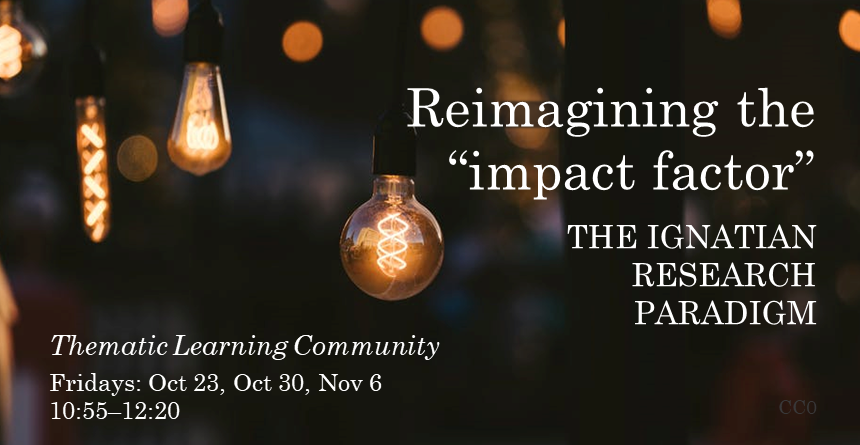
-
20FQ TLC - Ignatian Research Paradigm - details
-
Thematic Faculty Learning Community
Reimagining the “Impact Factor”: The Ignatian Research Paradigm
Co-sponsored by the Center for Jesuit Education, the SU ADVANCE Program, the Institute for Catholic Thought and Culture, and the Center for Faculty Development
Facilitated by Kristi Lee (College of Education) and Jen Tilghman-Havens (Center for Jesuit Education)
How can faculty scholarship contribute to the common good? How does Seattle University’s Jesuit mission invite a reimagining of research and scholarship in light of our distinctive place within the academy? This Thematic Faculty Learning Community will explore these questions in light of the university’s mission and through the directives of the SU Advance Program (an NSF-sponsored grant to examine pathways to promotion for women faculty in STEM and beyond).
What's in it for you?
Faculty will be inspired to reimagine their own scholarly agendas within an evolving mission-inspired paradigm. This three-part Thematic Faculty Learning Community will:
- introduce faculty to a newly conceptualized framework, the Ignatian Research Paradigm, which critiques the industry standard of using measurements like the “impact factor,” and instead suggests a larger conception of “impact.”
- invite faculty into conversation with other scholars engaged in mission-based research (community-engaged research, scholarship for equity and justice, etc.)
- engage faculty in a process to reflect on their own passions and interests as they develop their next research agenda.
Participants will also receive a stipend of $100 upon completion.
The foundational work for this series was recently presented to a summit of the Jesuit universities on the West Coast.
Who is it suited to?
All faculty will be invited to attend. We imagine this series being of particular interest to new faculty as well as faculty recently promoted to Associate or Full Professor.
What are the dates?
The three dates in Fall Quarter are:
- Fri, Oct 23 | 10:55–12:20 | Zoom link to follow
- Fri, Oct 30 | 10:55–12:20 | Zoom link to follow
- Fri, Nov 6 | 10:55–12:20 | Zoom link to follow
How do I apply?
To apply for the Ignatian Research Paradigm Learning Community, please complete this application form on Survey Monkey by Monday, September 28 at 12:00pm.
We will notify all applicants of their participation by Friday, October 2 at 5:00pm.
Please be sure to block off the three sessions in your calendar when you apply so that you are definitely available.
Any questions about the series can be directed to Kristi Lee (leekrist@seattleu.edu) or Jen Tilghman-Havens (tilghman@seattleu.edu).
*The application form for this series is separate from the registration form for other Center events.
»Applications are now closed
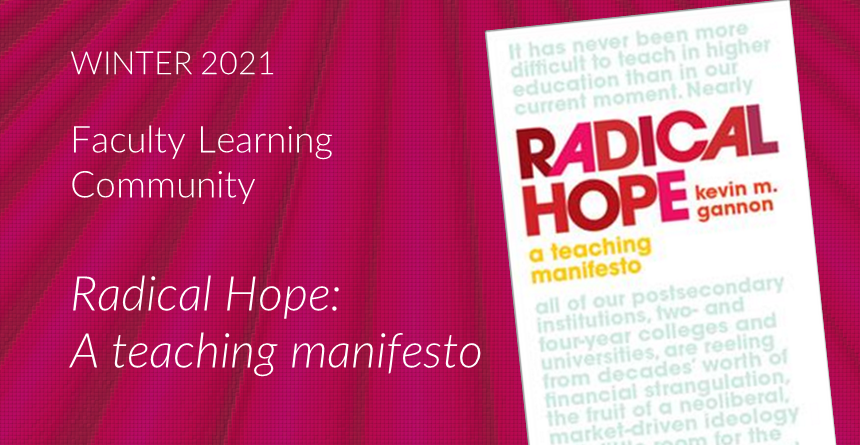
-
21WQ FLC Radical Hope - details
-
Faculty Learning Community
Radical hope: A teaching manifesto
Higher education nationally is fraught with challenges: its value is frequently questioned, its financial stability is in jeopardy, its inequities have become more apparent in the pandemic, and it is far from immune to the myriad racial and social injustices in society. For many faculty, our current work situation brings deep desolations. Against this disquieting landscape of higher ed, Kevin M. Gannon's book, Radical Hope, offers both a path forward for educators and reasons for hope in our time.
From the publisher: "Radical Hope is an ambitious response to this state of affairs, at once political and practical - the work of an activist, teacher, and public intellectual grappling with some of the most pressing topics at the intersection of higher education and social justice. Kevin Gannon asks that the contemporary university's manifold problems be approached as opportunities for critical engagement, arguing that, when done effectively, teaching is by definition emancipatory and hopeful.
"Considering individual pedagogical practice, the students who are the primary audience and beneficiaries of teaching, and the institutions and systems within which teaching occurs, Radical Hope surveys the field, tackling everything from impostor syndrome to cell phones in class to allegations of a campus 'free speech crisis.' Throughout, Gannon translates ideals into tangible strategies and practices (including key takeaways at the conclusion of each chapter), with the goal of reclaiming teachers' essential role in the discourse of higher education."
In this three-session Learning Community, facilitated by Katherine Raichle, you'll read through the book with colleagues and explore how this material applies to your work as an educator.
What's in it for you?
Over the three sessions, you'll learn how to:
- Re-examine higher education with the goal of fostering a renewed hope in your role as an educator to face challenge.
- Identify ways that social injustice is manifest in your classrooms and how to make needed changes.
- Alter your pedagogical practices to create more equitable access to education for all your students.
Who is it suited to?
This community is for any faculty member who seeks to change their teaching practices and curricula in the face of the numerous challenges at the heart of higher ed.
Radical Hope is 152 pages long, and the reading will be split across the three sessions to be manageable for participants.
What are the dates?
The three dates in Winter Quarter are:
- Fri, Jan 29 | 11:00–12:15 | Zoom link provided upon registration
- Fri, Feb 12 | 11:00–12:15 | Zoom link provided upon registration
- Fri, Feb 26 | 11:00–12:15 | Zoom link provided upon registration
Please register by noon on Wednesday, January 20.
» Registration is now closed.
2019–20
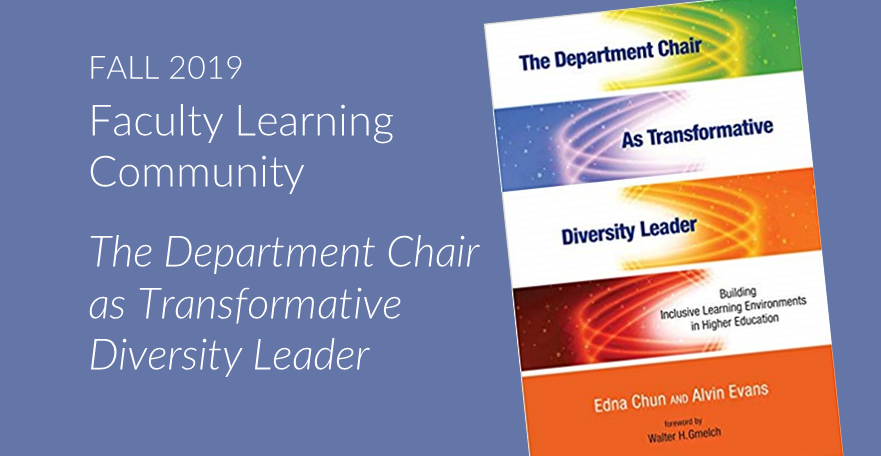
-
19FQ Department Chair as Transformative Diversity Leader - details
-
Faculty Learning Community
Co-Sponsored by the Office of Diversity and Inclusion
Are you interested in seeking concrete tools and strategies for successfully implementing diversity in your department or program? Edna Chun and Alvin Evans’s The Department Chair as Transformative Diversity Leader: Building Inclusive Learning Environments in Higher Education provides practical, research-based approaches representative of best practices from across the United States to achieve this result.
In this four-session Learning Community, facilitated by David Green (Center for Faculty Development), you'll work your way through the chapters of the book so that you are better prepared to lead other faculty in advancing diversity in multiple areas, including tenure and promotion, curricular change, student learning outcomes, departmental climate, and the representation of a diverse faculty and staff.
What's in it for you?
Over the four sessions, you'll learn how to:
- Implement a conceptual framework for diversity transformation
- Develop strategies for attaining consensus on a diversity agenda
- Develop strategies for overcoming environmental hurdles and navigating the academic infrastructure
- Recruit and retain a diverse faculty
- Enhance diversity learning outcomes and student identity development
- Develop a department or program diversity strategic plan
Who is it suited to?
This community is primarily for department chairs and program directors, but other faculty member who are interested in promoting an inclusive learning environment would also benefit from this learning community.
The Department Chair as Transformative Diversity Leader is 181 pages long, and reading will be split across the four sessions to be manageable for participants.
What are the dates?
The four dates in Fall Quarter are:
Fri, Oct 25 | 2:00–3:15 | Wismer Room (LOYA 400)
Fri, Nov 8 | 2:00–3:15 | Wismer Room (LOYA 400)
Fri, Nov 22 | 2:00–3:15 | Wismer Room (LOYA 400)
Fri, Dec 6 | 12:45–1:50 | Jolly Lounge (STCN 122)» Registration is now closed
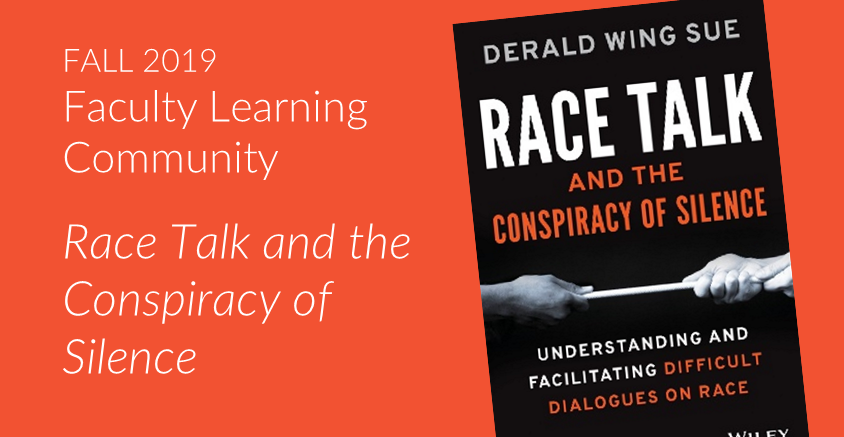
-
19FQ Race Talk and the Conspiracy of Silence - details
-
Faculty Learning Community
Co-Sponsored by the Office of Diversity and Inclusion
Remember that day when you attempted to address race in your course, faculty or staff meeting and you wish you hadn’t? Derald Wing Sue’s Race Talk and the Conspiracy of Silence: Understanding and Facilitating Difficult Dialogues on Race provides a guide for those who find initiating and participating in discussions about race difficult.
In this four-session Learning Community facilitated by Holly Slay Ferraro (Center for Faculty Development), you’ll read through the book with colleagues and explore the nature of race talk, constraints placed on race talk, and strategies for engaging in race talk more successfully.
What's in it for you?
Over the four sessions, you'll learn how to:
- Articulate what ideologies impede race talk (such as colorblindness)
- Identify conditions for having honest race talk
- Become an agent for change (breaking through unproductive race talk)
- Facilitate race talk using tested strategies
Who is it suited to?
This community is for any faculty member who wishes to develop their skills for leading and participating in potentially difficult conversations about race.
Race Talk and the Conspiracy of Silence is 274 pages long, and the reading will be split across the four sessions to be manageable for participants.
What are the dates?
The four dates in Fall Quarter are:
- Tues, Oct 22 | 1:30–2:45 | HUNT 150
- Tues, Nov 5 | 1:30–2:45 | Wismer Room (LOYA 400)
- Tues, Nov 19 | 1:30–2:45 | Wismer Room (LOYA 400)
- Tues, Dec 3 | 1:30–2:45 | Wismer Room (LOYA 400)
» Registration is now closed
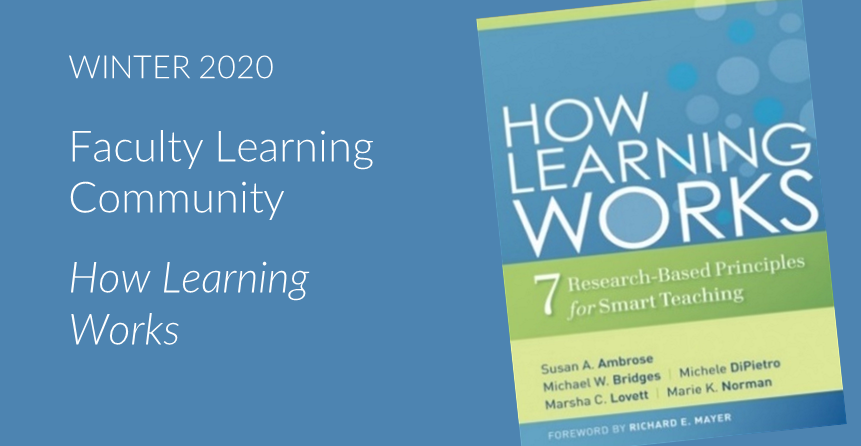
-
20WQ FLC - How learning works - click for details
-
Faculty Learning Community
How learning works: Seven research-based principles for smart teaching
Are you interested in finding out more about your students’ learning and adjusting your own courses as a result? How Learning Works, written by faculty developers from Carnegie Mellon University, is grounded in evidence from cognitive sciences, education, and psychology, and presents seven key principles that you can use to inform the design of your courses. Covering such topics as mastery, prior knowledge, motivation, and classroom climate, this book has gained an international reputation for its clarity, rigor, and practicality. In this four-session Learning Community, facilitated by Katherine Raichle (Center for Faculty Development), you’ll be able to increase your understanding of learning, plan concrete changes for your classes, and discuss the results of these changes with an interdisciplinary group of peers.
What's in it for you?
Over the course of this learning community, you'll:
- Set regular goals to try out new ideas in your current courses,
- Learn insights from the book and other group members,
- Provide one another feedback on your course experiments and adjustments,
- Have the support of colleagues who are facing similar issues and,
- Gain confidence in your ability to make well-informed decisions to aid your students’ learning.
Who is it suited to?
This community is for any faculty member who would like to take a more research-based approach to teaching. Ideally, you would be teaching in Winter so that you can put new ideas into practice immediately and are therefore better able to contribute to group discussion and reflection. This will give everyone greater insight into the variability of teaching contexts and norms, and can lead to a deeper appreciation of disciplinary nuances in higher education.
How learning works: Seven research-based principles for smart teaching is 224 pages long, and the reading will be split across the four sessions to be manageable for participants.
What are the dates?
The four dates in Winter Quarter are
- Tuesday, Jan 28 | 2:00–3:15 | Wismer Room (Loyola 400) | Coffee/tea provided
- Tuesday, Feb 11 | 2:00–3:15 | Wismer Room (Loyola 400) | Coffee/tea provided
- Tuesday, Feb 25 | 2:00–3:15 | Wismer Room (Loyola 400) | Coffee/tea provided
- Tuesday, Mar 10 | 2:00–3:15 | Wismer Room (Loyola 400) | Coffee/tea provided
»Registration is now closed.
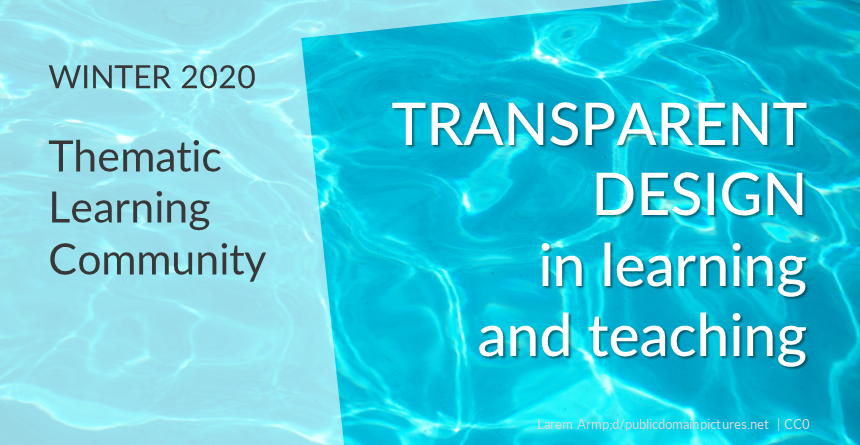
-
20WQ TLC - Transparent design - click for details
-
Thematic Learning Community
Transparent design in higher education teaching and leadership: A guide to implementing the transparency framework institution-wide to improve learning and retention
Co-sponsored by the Office of Diversity and Inclusion (ODI)
We know from decades of research that access to learning is inequitable for students, continuing an unjust pattern of underrepresentation and underachievement in higher education for specific groups of people. Faculty are often left feeling that addressing such huge discrepancies is beyond their control. Yet there are simple and immediate ways to create more equitable access to learning in your classes.
In this learning community, facilitated by Katherine Raichle (Center for Faculty Development), we will explore a simple and high-impact transformational approach to teaching – the Transparent Design in Learning and Teaching initiative in higher education (TILT). Put simply, TILT is an approach to teaching that helps students better understand how and why they are learning course content. Even tiny adjustments to teaching practices informed by TILT have been shown to bridge inequitable access to learning, enhancing learning for all students, while importantly benefiting underrepresented students in particular. Moreover, research has shown a lasting impact of TILT on student confidence, metacognitive self-awareness, sense of belonging, and persistence.
This is a hands-on and practice-oriented thematic learning community where we will learn about TILT and apply its principles to the design of assignments and teaching practices in our classes.
What's in it for you?
Over the four sessions, you'll learn how to:
- Make small and immediate changes to your classes that enhance the learning outcomes for all your students – especially those from underrepresented groups,
- Apply the principles of Transparency in Learning and Teaching to the teaching practices in your classes,
- Design assignments that align with Transparency in Learning and Teaching practices.
Who is it suited to?
This community is for any faculty member who is seeking to enhance their students’ learning and make their learning practices more equitably accessible to all students.
We will cover several selected readings, including sections of the book Transparent design in higher education teaching and leadership, a copy of which we will provide for you. The readings will be split across the four sessions to be manageable for participants.
What are the dates?
The four dates in Winter Quarter are
- Fri, Jan 31 | 9:30–10:45 | ADMN 323 | Coffee/tea provided
- Fri, Feb 14 | 9:30–10:45 | Casey Commons (CASY 530) | Coffee/tea provided
- Fri, Feb 28 | 9:30–10:45 | Casey Commons (CASY 530) | Coffee/tea provided
- Fri, Mar 13 | 9:30–10:45 | Casey Commons (CASY 530) | Coffee/tea provided
»Registration is now closed.
2018–19
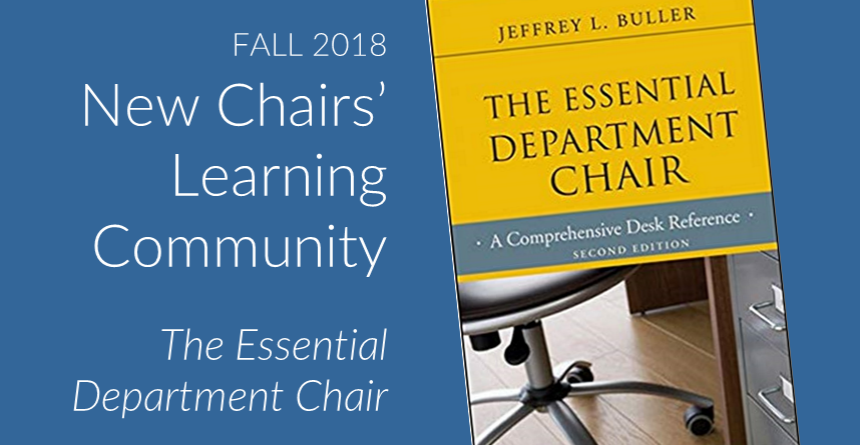
-
18FQ FLC 1 - The Essential Department Chair - details
-
Faculty Learning Community
The Essential Department Chair
In this four-session Learning Community facilitated by Jacquelyn Miller (Center for Faculty Development) over fall quarter, invited participants – all department chairs and program directors who have started in their roles in the last two academic years – will work their way through the chapters in the book so that they feel better prepared to fulfill their academic leadership roles and thrive.
As this Faculty Learning Community has a limited pool of participants, registration occurs outside our usual processes.
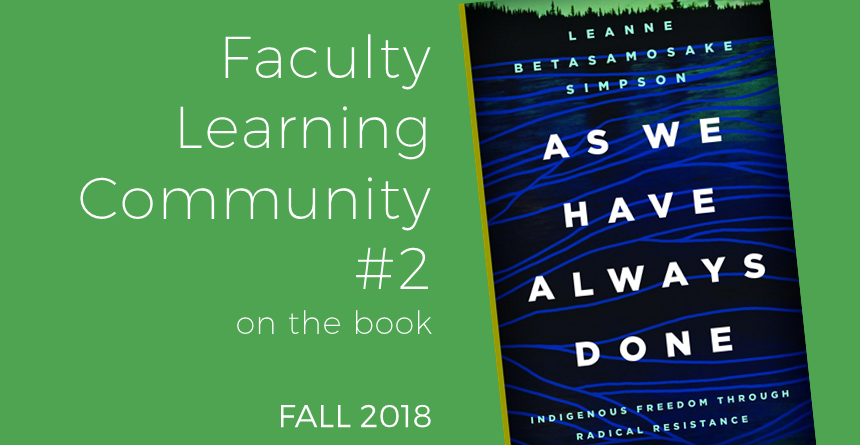
-
18FQ FLC 2 - As we have always done - details
-
Faculty Learning Community #2:
As We Have Always DoneIn preparation for Leanne Betasamosake Simpson's visit to Seattle U on January 11th, you are invited to join a Learning Community focused on the role of the academy in Indigenous liberation, facilitated by Christina Roberts (English Department/Indigenous Peoples Institute).
Over the course of four sessions, we will read Simpson's recent award-winning book, As We Have Always Done: Indigenous Freedom Through Radical Resistance, and 3-4 articles and book chapters that address settler colonialism, decolonization, and Indigenous resistance.
What's in it for you?
In this Learning Community, you'll share timely dialogue with colleagues as you learn more about the destructive logics of the settler colonial state. You'll also consider the role the academy and researchers play in the dispossession of Indigenous peoples from their lands so as to challenge the legacies of these damaging frameworks.
Who is it suited to?
This particular Learning Community is open to any faculty member who works with Indigenous communities or who'd like learn more about decolonizing classrooms, research practices, and lands.
What are the dates?
The four dates in Fall Quarter are
- Mon, Oct 22 | 12:30-2:00 | Xavier 160 (Indigenous Peoples Institute)
- Mon, Nov 5 | 12:30-2:00 | Xavier 160 (Indigenous Peoples Institute)
- Mon, Nov 26 | 12:30-2:00 | Xavier 160 (Indigenous Peoples Institute)
- Mon, Dec 10 | 12:30-2:00 | Xavier 160 (Indigenous Peoples Institute)
How to register
Registration is now closed
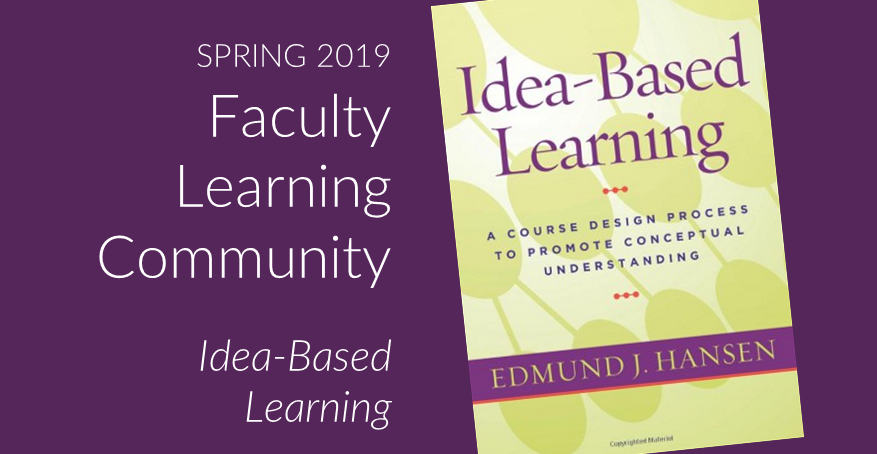
-
19SQ FLC - Idea-based learning - details
-
Faculty Learning Community:
Idea-based learning: A course design process to promote conceptual understandingHow do you systematically design a course so that it truly promotes deep learning and the kinds of critical thinking we espouse in academia? Edmund Hansen’s Idea-Based Learning provides a step-by-step process for thinking about and designing a course, focusing on key elements that will help maximize our students’ potential.
In this four-session Faculty Learning Community in the spring, we will progress through the chapters and develop or revise our own courses following Hansen’s recommendations, and we’ll discuss the sticking points and epiphanies we discover along the way.
How might you benefit from this FLC?
Over the four sessions, facilitated by Katherine Raichle (Center for Faculty Development), this book and our discussions will help you:
- Reconceptualize your discipline based on big ideas, not just a series of topics
- Develop a strong, but flexible, course structure
- Produce longer-lasting learning in our students
- Practice following a scholarly process that you can use for any future course design work
Who is it suited to?
This community is for any faculty member who is either designing a new course or revising an existing one.
What are the dates?
The four dates in Spring Quarter are
- Tue, Apr 30 | 1:30–2:45 | Wismer Room (LOYA 400) | Coffee/tea provided
- Tue, May 14 | 1:30–2:45 | Wismer Room (LOYA 400) | Coffee/tea provided
- Tue, May 28 | 1:30–2:45 | Wismer Room (LOYA 400) | Coffee/tea provided
- Tue, Jun 11 | 1:30–2:45 | CHDN 124 | Coffee/tea provided
How to register
Registration is now closed.
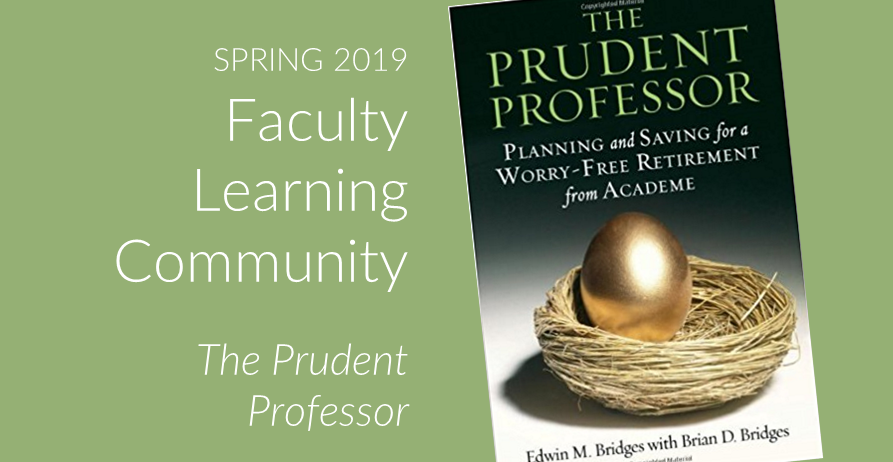
-
19SQ FLC - The Prudent Professor - details
-
Faculty Learning Community
The prudent professor: Planning and saving for a worry-free retirement from academe
Edwin Bridges’ The Prudent Professor is a practical guide for faculty of all ages who want to prepare for the financial aspects of retirement, and not just let it happen. The book draws on the author’s own careful research and long personal experience in building—and protecting—his retirement funds. He describes with candor his own successes and mistakes and his short, concise chapters provide both the rationale and methodology to identify one’s own personal goals at each stage of one’s career.
In this four-session Learning Community, facilitated by Jacquelyn Miller (Center for Faculty Development) during spring quarter, we'll work our way through the chapters of the book to determine what might work best for you in your own situation.
How might you benefit from this FLC?
Over the four sessions, you'll learn about:
- Retirement saving strategies
- Pre-retirement considerations
- Assessing different income streams during retirement
- How to make sure your retirement income lasts as long as you do
Who is it suited to?
This community is primarily for any faculty member who is interested in retirement planning.
The Prudent Professor is 334 pages long, and reading will be split across the four sessions to be manageable for participants.
What are the dates?
The four dates in Spring Quarter are
- Thu, Apr 25 | 12:15–1:30* | Wismer Room (LOYA 400) | Lunch provided
- Thu, May 9 | 12:15–1:30* | Wismer Room (LOYA 400) | Lunch provided
- Thu, May 23 | 12:15–1:30* | Wismer Room (LOYA 400) | Lunch provided
- Thu, Jun 6 | 12:15–1:30* | Wismer Room (LOYA 400) | Lunch provided
*If you teach until 12:20 on these days, you will still be able to join the group!
How to register
Registration is now closed.
2017–18
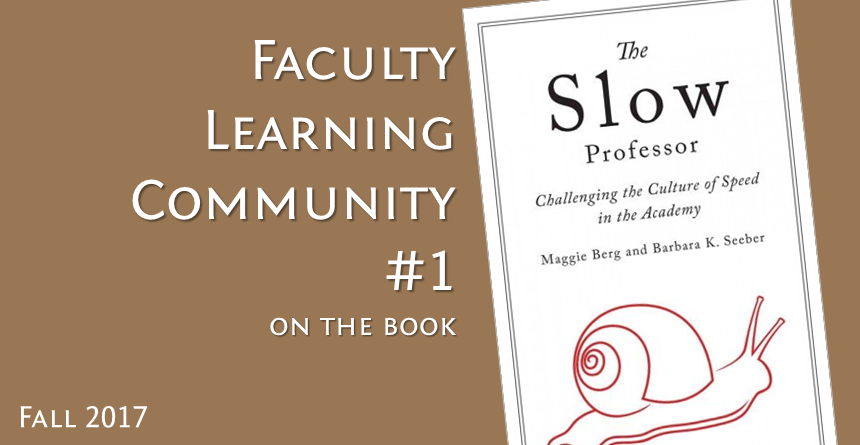
-
17FQ FLC 1 - The Slow Professor - details
-
Faculty Learning Community
The slow professor: Challenging the culture of speed in the academy
Are you interested in challenging the corporatization of the contemporary university’s increasing demands of speed and efficiency from faculty regardless of the consequences for education and scholarship? Maggie Berg and Barbara K. Seeber’s The Slow Professor: Challenging the Culture of Speed in the Academy presents both an analysis of the culture of speed in the academy and ways of alleviating stress while improving teaching, research, and collegiality.
In this two-session Learning Community facilitated by Jacquelyn Miller (Center for Faculty Development) during fall quarter, you'll work your way through the chapters of the book so that you are better prepared to live the principles of the Slow movement in academic life as a counter to the erosion of humanistic education.
2a. What's in it for you?
Over the two sessions, you'll learn how to adopt the principles of the Slow movement into your professional practice in an effective way to:
- Alleviate work stress
- Preserve humanistic education
- Resist the corporate university
2b. Who is it suited to?
This community is primarily for any faculty member who is interested in learning about changes in academic culture due to a more corporate approach and how to offset those changes in order to improve life–work balance.
The Slow Professor is just 94 pages long, and reading will be split across the two sessions to be manageable for participants.
2c. What are the dates?
The two dates in Fall Quarter are:
- Thu, Oct 19 | 10:30-11:45 | Wismer Room (LOYA 400)
- Thu, Nov 2 | 10:30-11:45 | Wismer Room (LOYA 400)
2d. How to register
Registration is now closed.
-
18WQ FLC 2 - The New Academic - details
-
Faculty Learning Community
The New Academic
Are you interested in learning about the culture of academia and how to be a more effective faculty member, but are not sure where to begin? Shelda Debowski’s The New Academic: A Strategic Handbook provides a guide for those new(-ish) to academe on how to develop an engaging and productive career as a faculty member.
In this four-session Learning Community facilitated by Jacquelyn Miller (Center for Faculty Development) over winter quarter, you'll work your way through the chapters in the book so that you feel better prepared to fulfill the various roles—colleague, teacher, scholar, disciplinary expert, public professional—expected of a new academic.
What's in it for you?
Over the four sessions, you'll learn how to:
- Get started - or reboot - as an academic
- Make a difference as an effective teacher
- Build an effective research track record
- Learn how to engage effectively with the public
- Advance your career in an academic setting
Who is it suited to?
This community is for any faculty member who is in the early stage of their academic career.
The New Academic is 219 pages long, and the reading will be split across the four sessions to be manageable for participants.
What are the dates?
The four dates in Winter Quarter are:
- Wed, Jan 31 | 2:15-3:30 | Wismer Room (LOYA 400)
- Wed, Feb 14 | 2:15-3:30 | Wismer Room (LOYA 400)
- Wed, Feb 28 | 2:15-3:30 | Wismer Room (LOYA 400)
- Wed, Mar 14 | 2:15-3:30 | Wismer Room (LOYA 400)
How to register
Registration is now closed.
-
18WQ FLC 3 - The Coach's Guide for Women Professors - details
-
Faculty Learning Community
The Coach’s Guide for Women Professors
Rena Seltzer’s The Coach’s Guide for Women Professors is a practical guide both for women—whether contingent faculty, tenure-stream faculty, or administrators—and for men who are supervising women in academe. Women often encounter unique barriers in academe and often carry heavier loads of service and care responsibilities than their male colleagues. This book offers succinct advice on how women faculty can prioritize the demands of their lives, negotiate better, create support networks, and move their careers forward.
In this three-session Learning Community, facilitated by Jacquelyn Miller (Center for Faculty Development) during winter quarter, we'll work our way through the chapters of the book so that we can determine whether and how Seltzer’s advice can lead women faculty to a more sane and joyful life.
What's in it for you?
Over the three sessions, you'll learn how to:
- Establish a productive writing practice
- Identify and overcome obstacles to your professional success
- Feel increased confidence in your leadership skills
- Develop a network of support
- Rediscover joy and balance in your work and personal lives
Who is it suited to?
This community is primarily for any faculty member who is interested in learning about the challenges that women face in academic and how to overcome them.
The Coach’s Guide for Women Professors is 199 pages long, and reading will be split across the three sessions to be manageable for participants.
What are the dates?
The dates in Winter Quarter are
- Thu, Feb 8 | 10:30-11:45 | Wismer Center, LOYA 400
- Thu, Feb 22 | 10:30-11:45 | Wismer Center, LOYA 400
- Thu, Mar 8 | 10:30-11:45 | Wismer Center, LOYA 400
How to register
Registration is now closed.
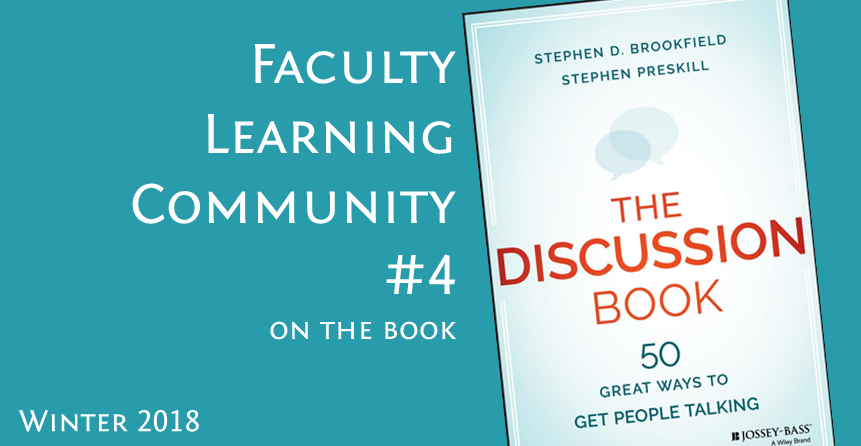
-
18WQ FLC 4 - The Discussion Book - details
-
Faculty Learning Community
The Discussion Book: 50 Great Ways to Get People Talking
Co-sponsored by the Center for Digital Learning & Innovation (CDLI)
Are you looking for new ways to get your students engaged in class discussions, to make sure that everyone gets heard, and to keep the conversation energized without going off-topic? If so this faculty learning community may be just what you are looking for. In their recent book, Stephen Brookfield and Stephen Preskill acknowledge and unpack the various ways that discussions often fail. They then offer 50 techniques to set up successful discussions depending on the setting. For every technique the authors cover: how it works; when and where it works well; what users appreciate; and what to watch out for.
This Learning Community will be facilitated by the Center for Faculty Development and the Center for Digital Learning & Innovation. During each session we will test out at least two of the techniques in the book and make notes about what worked and what didn’t. Between sessions we will also explore how those same techniques work when translated into online formats.
What's in it for you?
During these sessions, we’ll explore techniques—both in class and online—that:
- Get students to engage more fully in discussions
- Democratize participation
- Foster active listening
- Get students out of their comfort zone
- Keep students focused on important topics, contentious issues, and key questions—instead of getting diverted by trivia or avoidance
- Spur creativity so students are actively asking unusual questions, uncovering new perspectives, and proposing novel solutions
- Increase genuine collaboration and teamwork, right from the outset of the course
Who is it suited to?
This community is for any faculty member who is interested in learning how to improve their discussions either in the classroom, online, or both. Consider joining us If you would like to explore quick and easy techniques to get students talking, keep them focused on the topic, and fully engaged.
The Discussion Book is 260 pages long and covers 50 discussion strategies. We will focus on two strategies each session.
What are the dates?
The dates in Winter Quarter 2018 are:
- Fri, Jan 26 | 10:30–11:30 | CDLI Lab (PAVL 050)
- Fri, Feb 9 | 10:30–11:30 | CDLI Lab (PAVL 050
- Fri, Feb 23 | 10:30–11:30 | CDLI Lab (PAVL 050)
- Fri, Mar 9 | 10:30–11:30 | CDLI Lab (PAVL 050)
How to register
Registration is now closed.
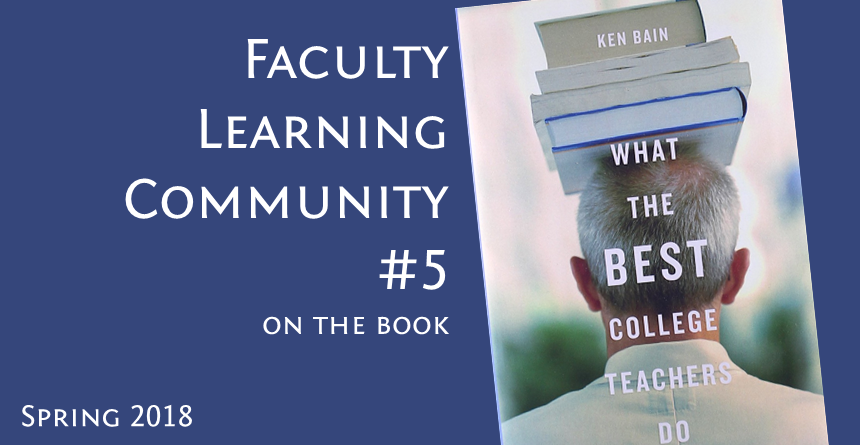
-
18SQ FLC 5 - What the best college teachers do - details
-
Faculty Learning Community
What the Best College Teachers Do
Are you interested in exploring the key characteristics of the most effective college teachers? What do these teachers know and what do they do to challenge their students to achieve their deepest potential? Ken Bain’s What the Best College Teachers Do explores the findings of a 15-year study of almost 100 college teachers, representing numerous academic disciplines and universities, to answer these questions.
In this three-session Learning Community facilitated by Katherine Raichle (Department of Psychology and Associate Director of Leaning and Teaching) in the spring quarter, you'll work your way through Bain’s book, gaining valuable insight into the myriad ways that highly effective college teachers approach their students, scaffold their lessons and classrooms, and design their courses.
What's in it for you?
Over the four sessions, you'll learn how to:
- How the author defines “the best” college teachers.
- How the best college teachers enhance the learning climate of their classrooms, inspire their students, and ultimately further learning outcomes
- How to recognize the ways that you are already successfully reaching your students, as well as how you can deepen these approaches.
- How to incorporate new strategies in your courses to enhance learning.
Who is it suited to?
This community is for any faculty member who is interested in learning how to improve their learning and teaching practices.
What are the dates?
The four dates in Spring Quarter are:
- Fri, Apr 13 | 11:00-12:15 | Wismer Room (LOYA 400)
- Fri, May 4 | 11:00-12:15 | Wismer Room (LOYA 400)
- Fri, May 25 | 11:00-12:15 | Wismer Room (LOYA 400)
How to register
Registration is now closed.
-
18SQ FLC 6 - The Prudent Professor - details
-
Faculty Learning Community
The Prudent Professor
Edwin Bridges’ The Prudent Professor is a practical guide for faculty at any age who want to prepare for the financial aspects of retirement, and not just let it happen. The book draws on the author’s own careful research and long personal experience in building—and protecting—his retirement funds. He describes with candor his own successes and mistakes and his short, concise chapters provide both the rationale and methodology to identify one’s own personal goals at each stage of one’s career.
In this four-session Learning Community, facilitated by Jacquelyn Miller (Center for Faculty Development) during spring quarter, we'll work our way through the chapters of the book to determine what might work best for you in your own situation.
What's in it for you?
Over the four sessions, you'll learn how to:
- Retirement saving strategies
- Pre-retirement considerations
- Assessing different income streams during retirement
- How to make sure your retirement income lasts as long as you do
Who is it suited to?
This community is primarily for any faculty member who is interested in retirement planning.
The Prudent Professor is 334 pages long, and reading will be split across the four sessions to be manageable for participants.
What are the dates?
The four dates in Spring Quarter are:
- Tue, Apr 17 | 12:20-1:30 | Wismer Room (LOYA 400)
- Tue, May 1 | 12:20-1:30 | Wismer Room (LOYA 400)
- Tue, May 15 | 12:20-1:30 | Wismer Room (LOYA 400)
- Tue, May 29 | 12:20-1:30 | Wismer Room (LOYA 400)
How to register
Registration is now closed.
2016-17
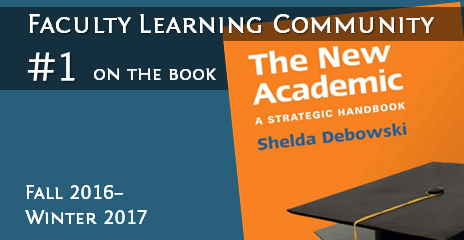
The New Academic: A Strategic Handbook
FACULTY LEARNING COMMUNITY
16FQ-17WQ
Are you interested in learning about the culture of academia and how to be a more effective faculty member, but are not sure where to begin? Shelda Debowski’s The New Academic: A Strategic Handbook provides a guide for those new(-ish) to academe on how to develop an engaging and productive career as a faculty member.
In this four-session Learning Community facilitated by Jacquelyn Miller (Center for Faculty Development) over fall and winter, you'll work your way through the chapters in the book so that you feel better prepared to fulfill the various roles—colleague, teacher, scholar, disciplinary expert, public professional—expected of a new academic.
Over the four sessions, you'll learn how to:
- Get started - or reboot - as an academic
- Make a difference as an effective teacher
- Build an effective research track record
- Learn how to engage effectively with the public
- Advance your career in an academic setting
This community is for any faculty member who is in the early stage of her/his academic career.
Request a consultation on this topic.
Borrow this book from the Center library.
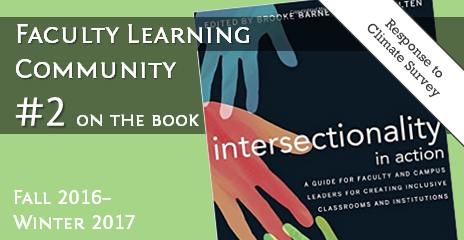
Intersectionality in action: A guide to faculty and campus leaders for creating inclusive classrooms and institutions
FACULTY LEARNING COMMUNITY
16FQ-17WQ
There has been much public debate recently on how to create a campus culture where all members feel included and supported. Brooke Barnett and Peter Felten have collected eleven essays into one learned guide for faculty and campus leaders in their efforts to create inclusive classrooms and institutions that do more than celebrate cultural difference and discourage intolerance of others.
This groundbreaking book aims to help readers, no matter what position they occupy on campus, develop the knowledge and capacities necessary to do this essential work and is premised on the understanding that identity, oppression, power, and marginalization cannot be addressed by looking solely at single identities.
In this three-session Faculty Learning Community facilitated by Natasha Martin (Associate Vice President for Institutional Inclusion and Chief Diversity Officer) over fall and winter, we will progress through topics of intersectionality and 1) the recruitment and retention of students, faculty, and staff; 2) the development of inclusive leaders, governing bodies, and advisory boards; 3) the campus environment; and 4) the larger world.
Over the four sessions, this book and our discussions will help you:
- Understand the multi-dimensional nature of intersectionality as a concept of identity formation;
- Develop campus leaders and structures that sustain an inclusive campus community;
- Create opportunities for civic engagement that are inclusive and transformative; and
- Link how working at the intersections of identity can lead to a more just and humane world.
This community is for any faculty member or academic leader who wishes to explore means of creating a more welcoming and inclusive campus environment using the lens of intersectionality.
Request a consultation on this topic.
Borrow this book from the Center's Library.
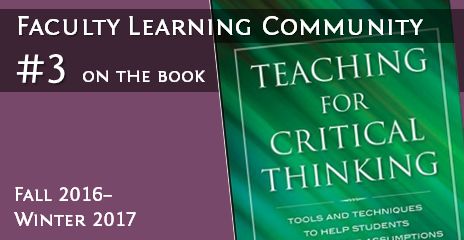
Teaching for critical thinking: Tools and techniques to help students question their assumptions
FACULTY LEARNING COMMUNITY
16FQ-17WQ
One of the few areas of agreement between educators, employers, and politicians is the need for graduates to be able to “think critically,” yet how that looks in reality can vary greatly between disciplines.
In Teaching for Critical Thinking, Stephen Brookfield distills these many approaches to create a basic protocol of critical thinking that focuses on students uncovering assumptions, exploring alternative perspectives, and taking informed action. Through a shared understanding of what constitutes critical thinking and how we might capture it, Brookfield goes on to provide broad principles and targeted exercises and activities that we can adapt to our different disciplinary settings.
In this four-session Faculty Learning Community over fall and winter, facilitated by Dean Peterson (Economics), we will progress through the chapters of the book and will consider how we might focus on critical thinking more proactively and transparently in one of our own courses.
Over the four sessions, this book and our discussions will help you:
- Clarify what critical thinking looks like in your own discipline
- Develop teaching methods that explicitly promote critical thinking among your students
- Explore critical thinking approaches that you might be able to adapt from other disciplines
This community is for any faculty members who wish to strengthen their students’ critical thinking in discussions, reading, and writing, whether in face-to-face, online, or hybrid courses.
Request a consultation on this topic.
Borrow this book from the Center's Library.
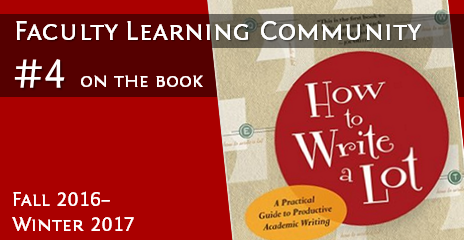
How to write a lot: A practical guide to productive academic writing
FACULTY LEARNING COMMUNITY
16FQ-17WQ
For some of us, building and maintaining research momentum during the academic year presents challenges. For others, returning to a stalled research project that has been languishing in a folder for months poses a different sort of psychological hurdle. For others still, a productive scholarly life comes at the expense of evenings, weekends, and vacation.
For each of these situations, Paul Silvia offers an array of strategies and tactics to help us be more productive in our research – and to do so without impeding our quality of life. Drawing examples from his own field of psychology, Silvia shows not only how we can overcome our writing roadblocks, but also provides detailed advice on how to write and revise articles, improve writing quality, and succeed in academic publishing.
In this four-session Faculty Learning Community over fall and winter, facilitated by Allison Henrich (Mathematics), we will progress through the chapters of this short and lighthearted book, try out different ideas in our own research practice, and explore the extent to which the author’s suggestions fit our own individual contexts.
Over the four sessions, this book and our discussions will help you:
- Identify any barriers that are holding you back in your research
- Experiment with new research and writing strategies
- Share triumphs and trials as you seek to find approaches that will work for you.
This community is for any faculty members who wish to boost their writing productivity without sacrificing evenings, weekends, and vacations.
Check out this book from the Center library.
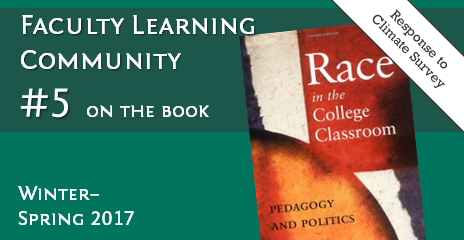
Faculty Learning Community #5:
Race in the college classroom: Pedagogy and politics
Co-sponsored by the Office of Institutional Inclusion and Chief Diversity Officer
What are the challenges facing a college professor who believes that teaching responsibly requires an honest and searching examination of race?
In Race in the College Classroom, edited by Bonnie TuSmith and Maureen T. Reddy, twenty-nine professors from the sciences, social sciences, humanities, and education seek to answer this question as they discuss the multiple facets and implications of teaching race in a racialized society.
Among other aspects, the authors address the temptation not to challenge students for fear of reprisals, how the classroom environment is itself structured by race, and the varying ways that faculty of color and white faculty are affected by teaching about race in their classes.
In this four-session Faculty Learning Community over winter and spring (facilitator TBA), we will progress through the chapters of the book and will reflect on how we currently address race in our own classrooms and what transformative practices will help us do so better.
5a. What's in it for you?
Over the four sessions, this book and our discussions will help you:
- Build a community of colleagues with whom to discuss the pedagogical challenges of race
- Find ways to dismantle the structures of race that often unwittingly operate in our classrooms
- Explore strategies to transform student learning by addressing race, rather than circumventing it
5b. Who is it suited to?
This community is for any faculty members who wish to strengthen their understanding of how race affects the academy in general and their own classes in particular. Whether in a discipline that addresses race as a regular part of the curriculum or one that tends to avoid it, this learning community will benefit all who wish to engage in racially just pedagogies.
Race in the College Classroom is 317 pages long, and reading will be split across the four sessions to be manageable for participants.
5c. What are the dates?
Thu, Feb 2 | 10:30-11:45 | Wismer Room (Loyola 400)
Thu, Mar 2 | 10:30-11:45 | Wismer Room (Loyola 400)
Thu, April 30| 10:30-11:45 | Wismer Room (Loyola 400)
Thu, May 25 | 10:30-11:45 | Wismer Room (Loyola 400)
5d. How to register
Registration is now closed.
Request a consultation on this topic.
Borrow this book from the Center library.
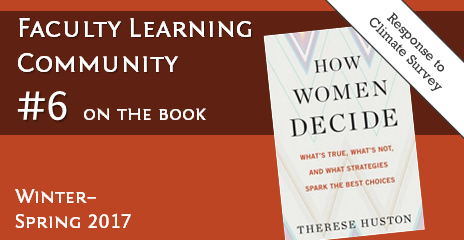
How women decide: What's true, what's not, and what strategies spark the best choices
FACULTY LEARNING COMMUNITY
17WQ-17SQ
Are you interested in gaining confidence that you and those with whom you work and play can make decisions that lead to effective and meaningful results? Therese Huston’s How Women Decide: What’s True, What’s Not, and What Strategies Spark the Best Choices explodes stereotypes and myths about female decision-making in order to offer intelligent guidance to the challenges and process of crafting better choices and becoming more courageous leaders.
In this four-session Learning Community facilitated by Jennifer Marrone (Department of Management) over winter and spring, you'll work your way through the chapters of the book so that you feel better prepared not only to make individual decisions, but to lead others, whether work colleagues, friends, or family, and to develop tactics and skills that will lead to wiser and stronger decisions.
Over the four sessions, you'll learn how to:
- Dismantle myths and stereotypes about women (and men) as decision-makers
- Recognize when you are in situations that often lead to poor decision-making
- Make better decisions and present them with greater confidence based on physiological, psychological, and social science research
- Develop better decision-making strategies and processes for work teams and/or committees
This community is for any faculty member who is interested in learning how to improve her/his decision-making skills and processes.
Borrow this book from the Center library.
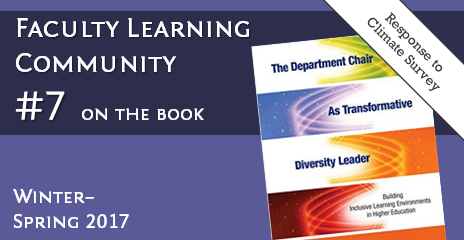
The department chair as transformative diversity leader: Building inclusive learning environments in higher education
FACULTY LEARNING COMMUNITY
17WQ-17SQ
Co-sponsored by the Wismer Office
Are you interested in seeking concrete tools and strategies for successfully implementing diversity in your department or program? Edna Chun and Alvin Evans’s The Department Chair as Transformative Diversity Leader: Building Inclusive Learning Environments in Higher Education provides practical, research-based approaches representative of best practices from across the United States to achieve this result.
In this four-session Learning Community facilitated by Jodi O’Brien, (Director, Wismer Center for Faculty Diversity and Inclusion) and Jacquelyn Miller (Center for Faculty Development) over winter and spring, you'll work your way through the chapters of the book so that you are better prepared to lead other faculty in advancing diversity in the several areas, including tenure and promotion, curricular change, student learning outcomes, departmental climate, and the representation of a diverse faculty and staff.
Over the four sessions, you'll learn how to:
- Implement a conceptual framework for diversity transformation
- Develop strategies for attaining consensus on a diversity agenda
- Develop strategies for overcoming environmental hurdles and navigating the academic infrastructure
- Recruit and retain a diverse faculty
- Enhance diversity learning outcomes and student identity development
- Develop a department or program diversity strategic plan
This community is primarily for department chairs and program directors, but other faculty member who are interested in promoting an inclusive learning environment would also benefit from this learning community.
Borrow this book from the Center library.
2015-16
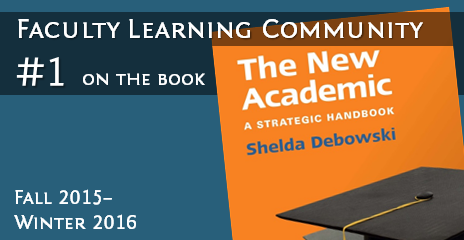
AY 16 Faculty Learning Community #1:
The New Academic
Are you interested in learning about the culture of academia and how to be a more effective faculty member, but are not sure where to begin? Shelda Debowski’s The New Academic: A Strategic Handbook provides a guide for those new(-ish) to academe on how to develop an engaging and productive career as a faculty member.
In this four-session Learning Community over fall and winter, you'll work your way through the chapters in the book so that you feel better prepared to fulfill the various roles—colleague, teacher, scholar, disciplinary expert, public professional—expected of a new academic.
Over the four sessions, you'll learn how to:
- Get started - or reboot - as an academic
- Make a difference as an effective teacher
- Build an effective research track record
- Learn how to engage effectively with the public
- Advance your career in an academic setting
This community is for any faculty member who is in the early stage of her/his academic career.
Professional development; early career stage
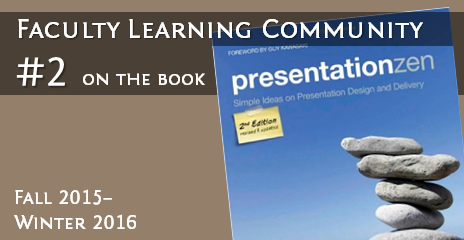
AY 16 Faculty Learning Community #2:
Presentation Zen
Presentations are a mainstay of academia: at conferences, on campuses, and in classes. And as we all know, many of them are bad. Really bad.
How can we distinguish our presentations from others’ in a way that truly engages our audiences with the ideas we hope to convey? Garr Reynolds’s Presentation Zen provides potential answers and examples, combining simplicity, storytelling, and good design in a way that helps presentations be “appreciated, remembered, and best of all, acted upon.”
In this four-session Faculty Learning Community over fall and winter, we will progress through the chapters and will each develop or revise an important upcoming presentation of our own. We’ll discuss the sticking points and epiphanies we discover along the way as we experiment with the art of creating presentations that work.
Over the four sessions, this book and our discussions will help you
- Take a different – and flexible – approach to creating presentations tailored to their contexts
- Focus on the story of your message before even thinking about how to present it
- Devise and design simple visuals that will complement and enrich your ideas, rather than detracting from them
- Work out how best to connect with and engage your audience during your presentation
This community is for any faculty member who has an important upcoming presentation or who simply wishes to take their presentations to a higher level.
Professional development; all career stages
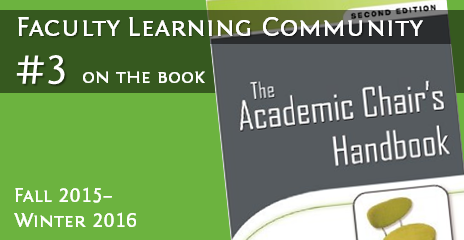
Faculty Learning Community #3:
The Academic Chair's Handbook
Are you interested in learning how to be a more effective leader of the faculty, staff, and students in your academic department or program? The authors of The Academic Chair's Handbook (Wheeler et al.) provide a guide for department chairs and program directors to develop a reflective and productive career as a faculty administrator.
In this four-session Learning Community over fall and winter, you'll work your way through the chapters in the book so that you feel better prepared to fulfill your current role as the leader of your academic unit.
Over the four sessions, you'll learn how to:
- Develop a conceptual understanding of the unique roles and responsibilities encompassed by academic leadership
- Develop the skills necessary to achieve results through working with faculty, staff, students, and other administrators
- Develop the practice of reflection that enables one to learn from past experiences in order to perfect the art of leadership
This community is for any current department chair or program director interested in the process of self-improvement as a faculty leader.
Professional development; mid-career and late-career stages
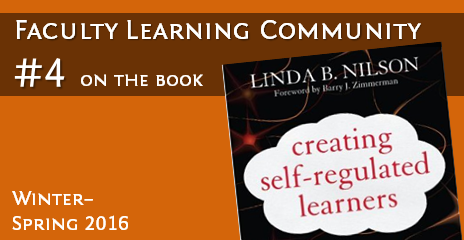
Faculty Learning Community #4:
Creating self-regulated learners:
Strategies to strengthen students' self-awareness and learning skills
Most students neither know how learning works nor what they have to do to ensure it, to the detriment both of their studies and their development as lifelong learners.
Linda Nilson’s point of departure in this book is the literature on “self-regulated learning” that tells us that deep, lasting, independent learning requires learners to bring into play a range of cognitive skills, affective attitudes, and even physical activities – about which most students are wholly unaware; and that self-regulation, which has little to do with measured intelligence, can be developed by just about anyone and is a fundamental prerequisite of academic success.
In this four-session Faculty Learning Community over winter and spring, we will progress through the chapters of the book and will consider how we might embed activities on self-regulation in one of our own courses.
Over the four sessions, this book and our discussions will help you:
- Adapt tested activities and assignments to your own courses so that students can progressively reflect on, monitor, and improve their learning skills
- Integrate self-regulation activities with different course components
- Prepare for introducing self-regulation activities in the classroom, recognizing that most of us are unfamiliar with these strategies.
This community is for any faculty members who wish to enhance their students’ skills in reflection, self-regulation, and lifelong learning.
Learning & teaching; all career stages
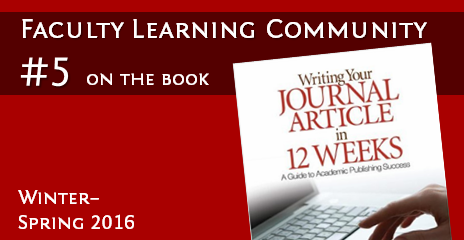
Faculty Learning Community #5:
Writing your journal article in twelve weeks:
A guide to academic publishing success
Do you have a manuscript that is waiting to be revised into an article for academic publication? Perhaps one where you just need a little more structure and nudging to refine and complete it?
If so, then Wendy Belcher’s Writing Your Journal Article in 12 Weeks is designed for you. It draws on research on such topics as faculty productivity, peer review, and common writing triumphs and failures, as well as on the author’s own experience as a journal editor and award-winning author herself. In the book, Belcher presents a carefully structured process to help you revise your manuscript and produce that final paper ready for submission in just twelve weeks.
In this four-session Faculty Learning Community over winter and spring, we will progress through the chapters of the book, meeting specific weekly writing goals in between, and producing a final manuscript ready for submission to an academic journal.
Over the four sessions, this book and our discussions will help you:
- Demystify the peculiarities of the academic publishing process
- Target the biggest writing challenges that faculty face
- Proceed step by manageable step with your own writing project
- Get published
This community is for any faculty member who is ready to REVISE a manuscript—whether a conference paper, unpublished article, chapter, or thesis—so that they can submit it to a suitable academic journal at the end of the 12 weeks. It is particularly suited to those in the humanities and social sciences.
Research practice; all career stages
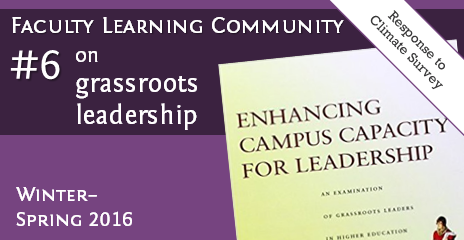
Faculty Learning Community #6 on grassroots leadership:
Enhancing campus capacity for leadership:
An examination of grassroots leaders in higher education
Are you interested in learning how faculty can have a profound influence on the culture of academia by becoming grassroots leaders, but are not sure where to begin? Kezar and Lester’s Enhancing Campus Capacity for Leadership provides a guide for examining the untapped potential of faculty to make a positive difference on their campus environment.
In this four-session Learning Community over winter and spring, you'll work your way through the chapters in the book so that you have a better grasp of the possibilities for and challenges of grassroots leaders.
Over the four sessions, in addition to becoming familiar with grassroots leadership as a field of study, you'll learn how to:
- Create meaningful change
- Enhance the campus climate
- Improve relationships among campus colleagues
- Enhance the student experience
This community is for any faculty member who is interested in effective grassroots leadership in a campus context.
Professional development; all career stages
2014-15
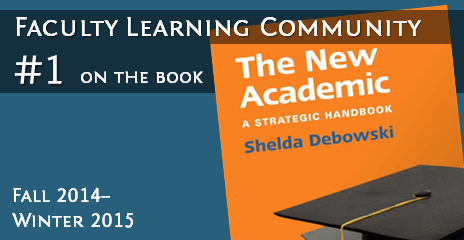
AY 15 Faculty Learning Community #1:
The New Academic
Are you interested in learning about the culture of academia and how to be a more effective faculty member, but are not sure where to begin? Shelda Debowski’s The New Academic: A Strategic Handbook provides a guide for those new(-ish) to academe on how to develop an engaging and productive career as a faculty member.
In this four-session Learning Community over fall and winter, you'll work your way through the chapters in the book so that you feel better prepared to fulfill the various roles—colleague, teacher, scholar, disciplinary expert, public professional—expected of a new academic.
Over the four sessions, you'll learn how to:
- Get started - or reboot - as an academic
- Make a difference as an effective teacher
- Build an effective research track record
- Learn how to engage effectively with the public
- Advance your career in an academic setting
This community is for any faculty member who is in the early stage of her/his academic career.
Professional development; early career stage
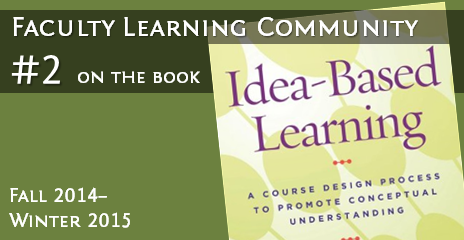
AY 15 Faculty Learning Community #3:
Idea-Based Learning
How do you systematically design a course so that it truly promotes deep learning and the kinds of critical thinking we espouse in academia? Edmund Hansen’s Idea-Based Learning provides a step-by-step process for thinking about and designing a course, focusing on key elements that will help maximize our students’ potential.
In this four-session Faculty Learning Community over fall and winter, we will progress through the chapters and develop or revise our own courses following Hansen’s recommendations, and we’ll discuss the sticking points and epiphanies we discover along the way.
Over the four sessions, this book and our discussions will help you:
- Reconceptualize your discipline based on big ideas, not just a series of topics
- Develop a strong, but flexible, course structure that will reach your higher goals
- Produce longer-lasting learning in your students
- Practice following a scholarly process that you can use for any future course design work
This community is for any faculty member who is either designing a new course or revising an existing one.
Learning & teaching; all career stages
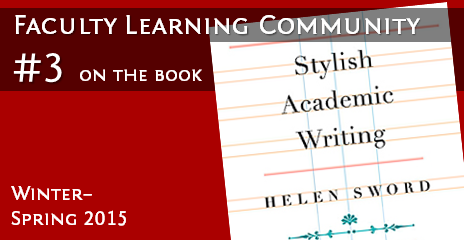
AY 15 Faculty Learning Community #3:
Stylish Academic Writing
Why is it that some academic writing appears to sparkle, while other texts feel flat and dull? What stylistic strategies do the most acclaimed academics use in their writing to present elegant ideas and data in elegant language? In Stylish Academic Writing (Harvard UP, 2012), Helen Sword shares key strategies and approaches that can breathe life into our academic work, recapturing through language the excitement we felt when we first developed our ideas. Based on her study of 1,000 academic articles, she provides examples from some of the best writers in the natural sciences, social sciences, and humanities for us to emulate in our own writing, along with clear guidance on how to get there.
In this four-session Faculty Learning Community over winter and spring, we will progress through the chapters and will craft and revise our own writing following Sword’s recommendations. We’ll discuss the stylistic habits – both good and bad – that we identify in our writing along the way, as well as strategies for strengthening the good and eliminating the bad.
Over the four sessions, this book and our discussions will help you:
- Assess the current state of your academic writing, its benefits and its deficits.
- Revise your texts so that the language does justice to the ideas.
- Identify and share strategies that will make stylish academic writing second nature.
This community is for any faculty member who is working on academic writing for publication. You may be working on a new paper from scratch, or rewriting a dissertation into something more digestible, or revising a manuscript that you know you could improve.
Research practice; all career stages
2013-14
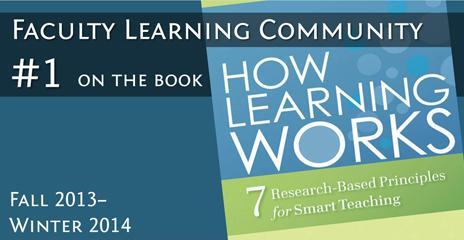
AY 14 Faculty Learning Community #3:
How Learning Works
Are you interested in finding out more about your students’ learning and adjusting your own courses as a result? How Learning Works, written by faculty developers from Carnegie Mellon University, is grounded in evidence from cognitive sciences, education, and psychology, and presents seven key principles that we can use to underpin the design of our courses. Covering such topics as mastery, prior knowledge, motivation, and classroom climate, this book has gained an international reputation for its clarity, rigor, and practicality. Over five sessions in Fall and Winter, we’ll be able to increase our understanding of learning, plan concrete changes for our classes, and discuss the results of these changes with an interdisciplinary group of peers.
Over the course of this 5-part series, you’ll
- set regular goals to try out new ideas in your current courses,
- learn insights from the book and other group members,
- provide one another feedback on your course experiments and adjustments,
- have the support of colleagues who are facing similar issues, and
- gain confidence in your ability to make well-informed decisions to aid your students’ learning.
This community is for any faculty member who would like to take a more research-based approach to teaching. Ideally, you would be teaching in both Fall and Winter so that you can put new ideas into use immediately and are therefore better able to contribute to group discussion and reflection. This will give everyone greater insight into the variability of teaching contexts and norms, and can lead to a deeper appreciation of disciplinary nuances in higher education.
Learning & teaching; all career stages
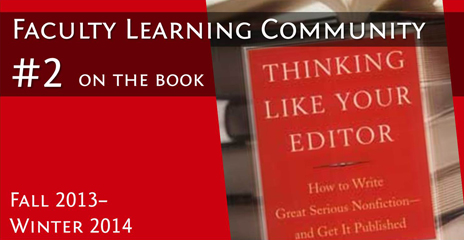
AY 14 Faculty Learning Community #3:
Thinking Like Your Editor
Would you like to write a book about your area of expertise for a broad audience, but you’re not sure where to begin? In this five-session series over Fall and Winter Quarters, you’ll learn some of the trade secrets for writing a successful nonfiction book. We’ll be reading and discussing Thinking Like Your Editor: How to Write Great Serious Nonfiction – and Get It Published, recommended by editors at Harvard University Press, Oxford University Press, and HarperCollins, to name just a few. We won’t be talking about how to write a book for the dozen specialists in your field, but how to write a book that’s sold at regular bookstores and reaches 1,000 or more people a year. Whether you’re already outlining chapters or you’re just toying with the glimmer of a book idea, this faculty learning community can take your thinking and writing where you most need them to go.
Over the course of this 5-part series, you’ll
- set goals for what you want to achieve by the end of Fall and Winter quarters,
- learn insights about the book publishing business,
- work on questions that can help you narrow or broaden (whichever you need more) your thinking on your book,
- analyze a successful book proposal,
- have the support of colleagues who are facing similar issues, and
- make progress on achieving your book writing goals.
You can be at the early thinking stages of your book idea or you can already be writing chapters. We do ask, however, that you come with the intent to work on a nonfiction book project for a broad audience, rather than a niche book for a select group of like-minded specialists or a journal article. We’ll be able to provide the best support for one another if we’re facing similar challenges.
Research practice; mid-career and late-career stages
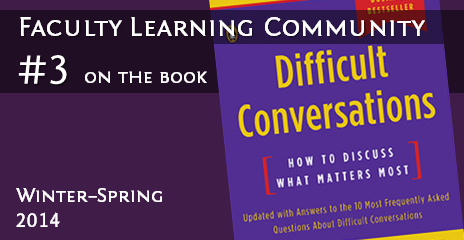
AY 14 Faculty Learning Community #3:
Difficult Conversations: How to Discuss What Matters Most
Are you interested in learning how to communicate effectively in difficult situations, but are not sure where to begin? Difficult Conversations, written by members of the Harvard Negotiation Project, provides a step-by-step approach for how to have your toughest conversations with less stress and more success. In this four-session Learning Community over winter and spring, you’ll work your way through the principles in the book so that you feel better prepared to engage in important conversations on tricky topics, be they with a colleague, a relative, or a friend.
If demand is high, then we will set up a separate group that will specifically focus on “difficult conversations around diversity.”
Over the four sessions, you’ll learn how to:
- Decipher the underlying structure of every difficult conversation
- Interpret the significance of what is said—and what is not
- Raise tough issues without triggering defensiveness
- Manage strong emotions—yours and the other party’s
- Stay balanced regardless of how the other party responds
This community is for any faculty member who would like to be better prepared for awkward conversations and wants to take a more measured and research-driven approach to broaching the topic. Ideally, you will have a future conversation in mind that you can consider as you work through the book with your learning community of up to 12 people. You may choose to share your topic with the group, but we won’t require that of you.
Professional development; all career stages
